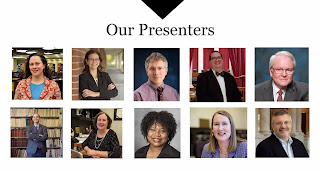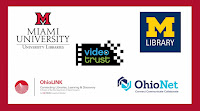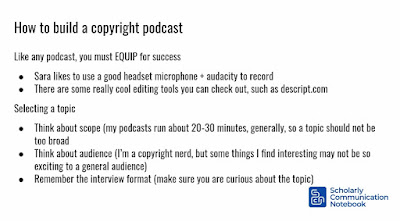This session is "Copyright Chat Live: Learning to be a copyright librarian through community conversations."
Presenters: Will Cross and Sara Benson
Description: In this session we will introduce the Scholarly Communication Notebook (SCN), an open, community-based resource for copyright education. We will explore the opportunities for connecting open education and copyright literacy through one of the unique projects that is part of the SCN, the Copyright Chat Podcast. Join us to participate in an interactive workshop where you will learn more about podcasts as OER (open educational resources), collaborate to decide on a topic for a podcast episode about the SCN, and help to record a live episode of the Copyright Chat Podcast. Come ready to participate in a fun and interactive session!
"Our collaboration is both from the mutual realization that scholcom [scholarly communications] and copyright have been under-addressed in LIS education." Coming out of library school, Cross wished that he knew more.
Open education gives us the opportunity to say that there is more than one correct answer. It allows for conversation. "...knowledge should not be an elite domain."
Cross noted that there is exciting work being done with open education at community colleges. That work should not be lost.
Benson's Copyright Chat Podcast goal is to bring quality information to the public. Not all of the podcast episodes are focused on copyright and libraries. Most of the episodes are interviews with experts. She is contributing a "fun way to learn about copyright by listening to the Chat podcast and completing exercises tied to episode content." The podcast is licensed to be open and she encourages others to build upon them.
Benson provided some podcast tips.
Benson and Cross then began recording a podcast episode of Copyright Chat using the conference participants as those asking questions of them on the topic of potential liability under the CASE Act and sovereign immunity. October 4 is the deadline to give comments to the Copyright Office on the CASE Act.
Does sovereign immunity extend to librarians in the scope of their employment at land grant institutions?
Benson referenced the Georgia State case. Sovereign immunity protects from large statutory damages. It does not prevent you from being sued and asking for an injunction. It is unclear if sovereign immunity extends to employees in the CASE Act.
Cross noted that sovereign immunity is for public information. the CASE Act is a small claims tribunal. Should individuals opt out? Should the be covered by their employment? If staff run the library, how can you separate them from the library?
Libraries serve society, hence Section 108. So it is weird to protect the institution and not the people who do the work.
This part of the CASE Act will impact what libraries do. If library employees are being sued, then that could cause libraries to shut down.
Libraries often weigh in on court cases that could impact libraries. We need to remember those and that advocacy is important.
Is there is a risk involved in stressing how the CASE Act will impact our daily work?
Benson says, "no." She did not include everything she does in her comment to the Copyright Office. She did include information on specific areas where this would have an impact (e.g., in her teaching). She used very normal examples.
Cross agreed that Fair Use is a risk assessment and exercising a "muscle." The Copyright Office has not always been a "library first" organization.
He also noted that there are concerns about sovereign immunity and its broad use. "These are stormy times." Benson noted ongoing conversations on sovereign immunity.
Question about the constitutionality of the CASE Act?
Benson believes this has to do with the tribunal, because it is not an official court and part of the judiciary. Cross noted that the 7th Amendment states that people have the right to a trial by jury.
While this tribunal is said to be for small claims, Cross notes that the amounts are not small, although small for large multi-national organizations.
Benson said that EFF is interested in backing a plaintiff, once someone is sued.
Does the CASE Act affect faculty?
The opt out provision is for libraries and archives specifically.
However, will the CASE Act affect faculty? Yes, but we don't know specifically how that will occur.
How do we educate our non-library community?
Benson noted that this is all still a moving target. Once we know more details, that education will be important. What is it? What are the potential outcomes? How does being at a state institution impact this? What are the options?
Be sure to talk with your administrators and the organization's counsel office.
Who should submit comments about the CASE Act?
Check with your institution and see if someone else should send in those comments, e.g., counsel office, dean of the library, government relations, etc.
Consider if you can send in a comment as yourself and not as an employee of your institution.
What type of communication would you have with your administration?
Cross said that our associations could produce model language. That would be a great service from our associations. Create a repository. It is too early to do that.
What's next?
People should sign-up for U.S. Copyright Offices notices. This will help you be engaged in the process.
Once things get a bit more settled, then we can create tools to help with our staff and faculty. Don't engage them too early, because right now things could change.
Will the CASE Act create copyright trolls?
Benson, yes, that is a possibility.
Someone has said the CASE Act could be a copyright troll factory. Trolling models already exist.
Resources:
- OER + ScholComm
- Scholarly Communication Notebook
- In Blackbeard Pirate Ship Case, Supreme Court Scuttles Copyright Claims (2020) - on sovereign immunity
- Copyright Small Claims and the Copyright Claims Board
- Copyright regulations and libraries: The CASE Act and how to make your voice heard (webinar recording)
- Draft Letter to US Copyright Office re: CASE Act Rulemaking
- Rise of the Copyleft Trolls: When Photographers Sue After Creative Commons Licenses Go Awry (2021)
- Creative Commons License Enforcement
- Beware the Copyleft Trolls (2021)
- MLA Copyright for Music Librarians



No comments:
Post a Comment